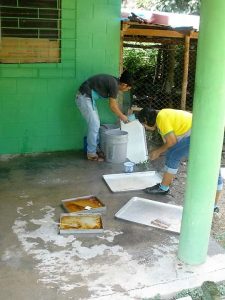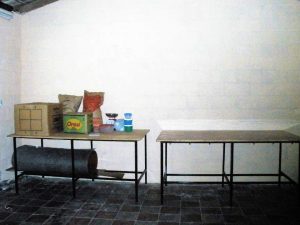This project is made possible through the partnership of WATER CHARITY and the NATIONAL PEACE CORPS ASSOCIATION. ![]()
Location
El Jicaro, El Salvador
Community Description
El Jicaro is located in the hills northwest of the city of Chalatenango, in El Salvador. In the late seventies, this small community became the first guerrilla camp in the area and was a magnet for Campesinos in the neighboring villages who decided to join the guerrilla movement. More than thirty years later, El Jícaro is a peaceful place, with a new generation of community members, many of whom are descendants of the guerrillas who fought and gave their lives in an attempt to change the society in which they lived.
El Jícaro has a population of approximately 235 people, making up about 64 households. About 40% of the population is under the age of twenty. On average, community members have a sixth-grade education. Agriculture is the primary means of income in the community, with the main crops being corn, millet, and beans. The majority of the families in the community have lived there since 1994 when the community was resettled following the signing of the Peace Accords after the Civil War.
There is a primary school that goes up to 9th grade, a communal meeting house, a Catholic church, and a community mill in El Jicaro. There are also two small shops that sell basic amenities and snacks.
Problem Addressed
In El Jicaro, a group of five women recently began a bakery with support from a Peace Corps Volunteer and funds from a World Connect grant. The bakery is located on communal land in the center of the community. The women have all the supplies for baking. However, there is no water connection at the site for use by the women or the public. The women must use buckets to transport water for baking and cleaning. In addition, the women do not have a water basin and must crouch on the floor while washing trays and other baking dishes.
Project Description
This project will provide a water spigot for the community and pila for the women at the bakery site. A pila is a large water basin found in most homes in rural El Salvador that is used for storing water, washing clothes, and washing dishes.
A pila will ensure that women can clean up in a more feasible and comfortable way. A small investment will make a large difference for these women as they establish their new business. A water spigot near the bakery site will be used as a public source of drinking water.
As mentioned earlier, the bakery is located in a central location where many visitors from outside communities as well as community members pass by. The spigot will be built under the direction of the community council and the water committee at this location to benefit many as a source of drinking water.
Project Impact
There are 235 people living in the community who will be impacted. This project will also benefit visitors to the community.
Peace Corps Volunte er Directing Project
er Directing Project
Ofira Honig
Monitoring and Maintenance
The pila will be stored inside the bakery and taken outside for use. The community will donate the labor for all of the work needed to prepare the ground and connect the pipes for the public water spigot. The bakery women, wanting to contribute for their water usage, have offered to pay the $1 monthly quota per household for personal usage of water once the spigot is installed.
Comments
Although this project is small, the water spigot and pila purchase will have a significant impact, especially on the five women of the bakery in El Jicaro. These women have worked hard to get the bakery business off the ground and are first-time business owners. They work extremely hard to make enough money to take out their $5 a day salary. This project will strengthen their business and make their lives, as well as the lives of all those in the community and those who visit, a bit easier.
Fundraising Target
$240
Donations Collected to Date
$240
Dollar Amount Needed
$0 – This project has been fully funded through the generosity of Michael and Jessica Raposa, of Charlestown, MA, USA.
The Peace Corps Volunteer was evacuated from the country for security reasons and was not able to implement the project. Donations for this project were re-allocated to other projects.